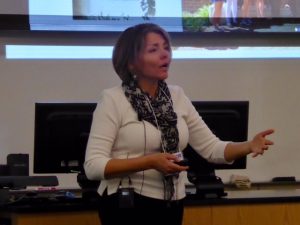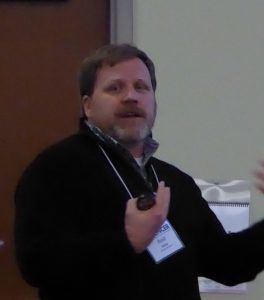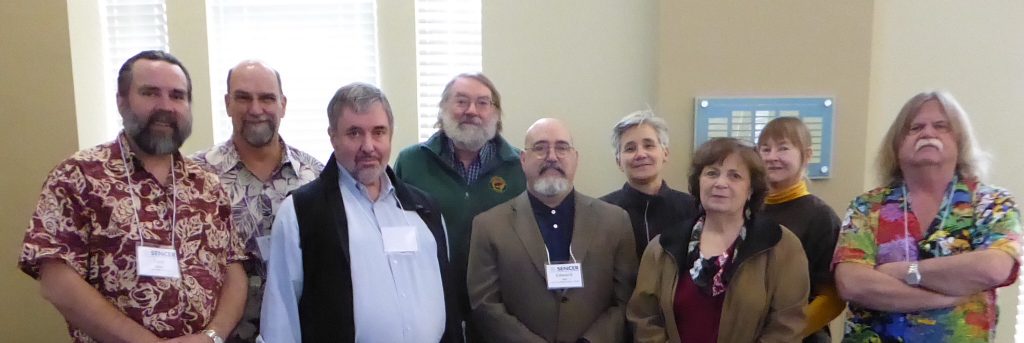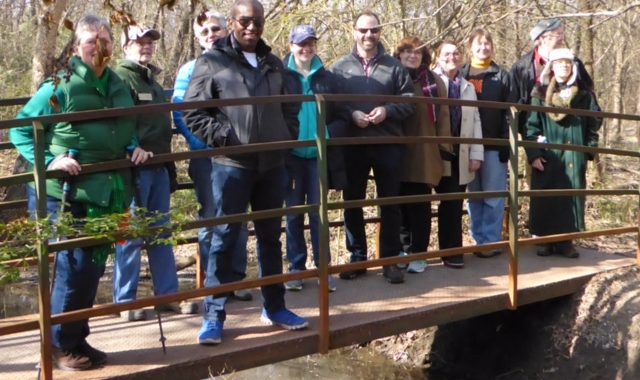Leaders at the SENCER Center for Innovation—Southwest (SCI-SW) hosted their third annual regional symposium at Texas Woman’s University (TWU) on February 2-3, 2017. This year’s theme was Expanding civic capacity: Connecting learning to critical real-world issues through teacher preparation and faculty development.
The symposium began on Thursday afternoon with a welcome from Dr. Abigail Tilton, Dean of the TWU College of Arts and Sciences. Thursday afternoon talks focused on preparing STEM teachers using SENCER pedagogy. Six nationally-recognized leaders from the SENCER community offered their insights and experience to the audience.

Dr. April Hill, University of Richmond
The first talk, presented by Dr. April Hill from the University of Richmond, discussed a set of validated principles and practices for fostering student thriving in undergraduate STEM majors. She explained how to expand lab sections into authentic research experience and how including civic engagement and evidence-based pedagogy can lead to student persistence. The second talk by Dr. Stephen Carroll from Santa Clara University addressed durable learning and ways to make learning long-lasting. He used his grant-writing course as an example of how he included civic issues in his class and how the practices result in deeper and more durable learning in his students. During Thursday afternoon’s session, Dr. Cathy Middlecamp from University of Wisconsin-Madison gave examples of how she teaches practice-based courses and how to balance between content and social context in classrooms. Her main message was that teaching context and teaching content is not an either/or proposition; rather, they are two sides of the same coin. She explained how we can start with the social issues and connect back to the concepts we teach.

Dr. Reid Bishop, Belhaven University
Dr. Reid Bishop from Belhaven University gave examples of how SENCER ideas resulted in a water conservation project at their local zoo, and how his students were able to solve some of the zoo’s problems. Dr. Garon Smith from the University of Montana offered examples of how undergraduate research can be used in teacher preparation courses. He emphasized that educators need to make sure that students’ STEM experiences are both exciting and focus on solving relevant problems. From Rider University, Dr. Kathy Browne discussed the Next Generation Science Standards (NGSS) for educating K-12 students and how we could include civic issues to engage students. She further discussed and how NGSS can be used to include civic engagement in teaching science principles.
The second session on Friday morning was centered on how SENCER techniques can help faculty, especially tenure-track faculty, develop fulfilling and successful careers. Dr. Jennifer Martin, TWU Interim Provost and Vice President for Academic Affairs, welcomed everyone to TWU and emphasized her appreciation for the enthusiasm she sees for SENCER ideas. After the welcome, SCI-SW co-directors Nasrin Kohan and Cynthia Maguire expressed their gratitude to Dr. Richard D. Sheardy, Professor and Chair of the TWU Department of Chemistry and Biochemistry, for his inspiration, expertise, and passion while serving as a SCI-SW co-director. Sheardy will continue to serve as the center’s liaison to the SCI–SW advisory board.
The first speaker of the day, Dr. Ed Katz from University of North Carolina at Asheville, suggested looking for an idea or project that connects teaching, service, and scholarship. Finding such an idea allows faculty to work on one large project instead of juggling three separate career-advancement activities. In his second talk during this symposium, Dr. Stephen Carroll discussed using the SALG assessment instrument (SALGsite.org). He explained that SALG has been designed to promote metacognition for students and provide meaningful feedback to faculty—a “win-win” situation. Use of the instrument is free and accepted by many accreditation agencies. Dr. Karen Oates talked to participants about how to keep their careers on track but also how to find their passions. She emphasized the quote by O. W. Holmes, “most of us go to our graves with the music still inside us,” and discussed what this means and how to make sure we follow our dreams.

SCI-SW Spring 2017 Meeting Speakers
Dr. Dick Sheardy addressed the tenure-track career from a chair’s perspective. He emphasized that involving civic engagements in research and classes can be counted as scholarship and should be included in promotion packages, but also expounded that each faculty needs to talk to their chair and administrators to understand the expectations at a particular institution. He gave examples of how we can expand our students’ horizons by showing them the real world issues, and how this makes disciplinary content knowledge important in students’ eyes. From George Mason University, Dr. Tom Wood’s presentation highlighted the importance of being exposed and connected to the natural world. He said students who go to a natural area for a few hours the day before an exam score about 20% higher. He raised the question, “Don’t we have an obligation as educators to do better at connecting students with the natural world?” Dr. Matthew Fisher from Saint Vincent College talked about the scholarship of teaching and learning, and encouraged everyone to build upon work of others. He talked about how we can design courses for science majors in such a way that we encourage their engagement and sense of responsibility as scientists.
At the closing remarks on Friday, SCI-SW leaders recognized NCSCE staff members Kyle Simmons, Christine DeCarlo, and Danielle Kraus Tarka, and thanked Dr. Kim Miloch, Director, and Ms. Kaye Garrison, Senior Secretary, of the Learn by Doing Quality Enhancement Plan (QEP) at TWU for their extensive support and assistance with the regional meeting.
[bctt tweet=”SCI-Southwest Holds Regional Meeting on Expanding Civic Capacity @txwomans” username=”NCSCE”]Preceding the symposium this year, on Thursday morning a newly formed SCI-SW advisory board meeting was held with the members of the advisory board and faculty and administrators from TWU. Plans were discussed to strengthen the SENCER community at TWU and in the southwest region.
For the first time, this year SCI-SW planned a field trip on Friday afternoon to the Clear Creek Natural Heritage Center for the symposium speakers and SENCER co-directors visiting from out of state. As expressed by the attendees, it was a great field trip learning about wildlife and habitats of Texas. The group took a hike on established trails near the confluence of Clear Creek and the Elm Fork of the Trinity River.
Following the SCI-SW meeting, the regional co-directors met on Saturday, February 4th and laid out and clarified some strategic plans for the coming year. During this meeting, Nasrin Kohan of TWU and Ulla Hasager of the University of Hawaiʻi at Mānoa were officially named as co-directors.
Plans are underway now to hold next year’s regional symposium at TWU on February 2-3, 2018.

